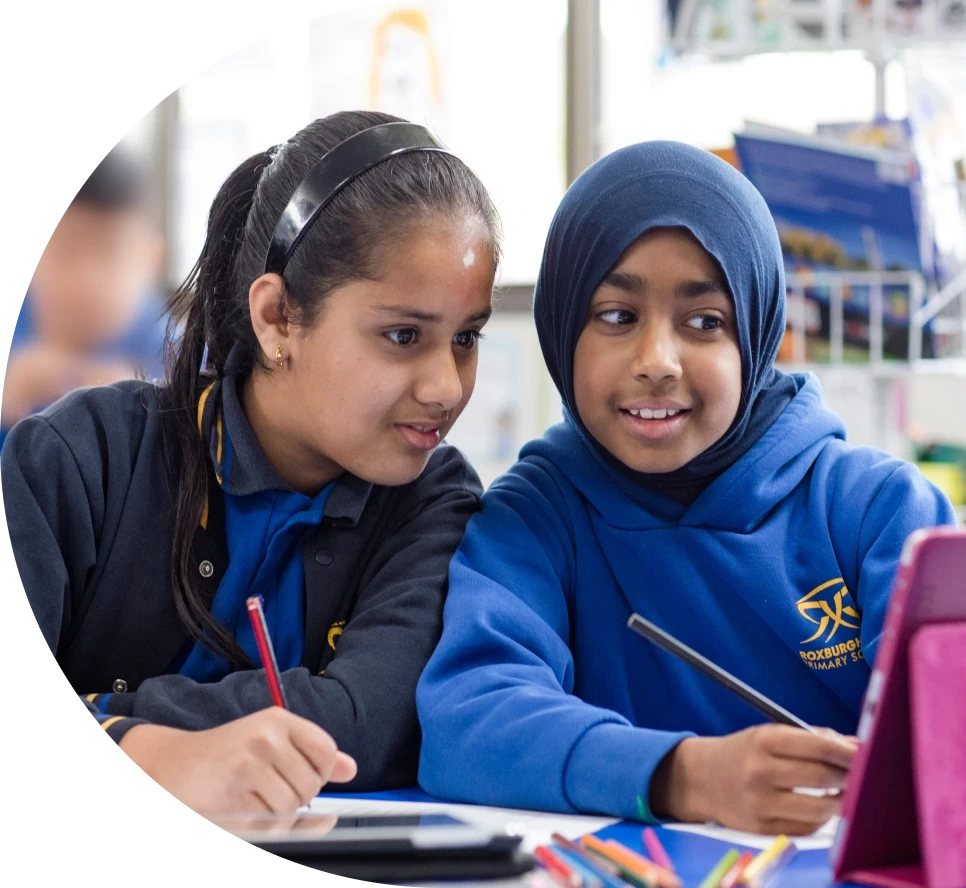Showcases student and cohort achievements on the IBT’s Psychometric reporting scales
Improve learning in your school with the IBT – a trusted assessment, designed by experts.
- Identify where your students are in their learning, and target teaching to help them progress
- Assess deep conceptual understanding and higher order thinking
- Benchmark your students’ performance with schools across the UAE and internationally
- Build capacity with hands-on IBT and data literacy workshops

Multiple test cycles
Choose the window that aligns best with your academic calendar. Schools can opt for two test cycles, ensuring a minimum of six months between them for a more accurate comparison of performance and progress across that period.
- January
- May
- November
IBT learning areas
The IBT is skills-based and compatible across curricula, allowing students from all countries to be benchmarked fairly.
English
In English the skills assessed are: locating information, inferring, predicting, drawing conclusions and reasoning. Students are not asked merely to retrieve information from a passage; they are asked to make inferences, form judgements and reflect on the texts. Questions addressing higher-order thinking skills are used to ascertain whether a student can 'read between the lines' and understand subtlety and nuance in the English language.
Assessed English strands
- Reading Comprehension
- Spelling
- Punctuation
- Grammar
- Vocabulary
Mathematics
In Mathematics the skills assessed include interpreting data, inferring, predicting, drawing conclusions, reasoning and problem solving. For Mathematics questions, students are asked to make sense of mathematical concepts in everyday situations. IBT Mathematics is not about simply remembering rules and procedures; it requires students to use higher-order thinking skills to apply their mathematical skills to solve problems.
Assessed Mathematics strands
- Number
- Measurement
- Space
- Chance and Data
Science
In Science the skills assessed include: observing and measuring, interpreting data, inferring, predicting, drawing conclusions, reasoning and problem solving. Students are asked to apply scientific principles to particular problems. IBT Science not only assesses students' knowledge of science, it assesses whether students are capable of applying this knowledge to given contexts. Many of the questions are based on scientific enquiry.
Assessed Science strands
- Earth Science
- Physical Science
- Life Science
Reasoning
In Reasoning, the skills assessed require students to think critically, make logical deductions, identify connections and spot patterns. The questions asked do not require any prior knowledge from any particular content area. Instead, students must demonstrate their abilities to think outside the box and use their higher-order thinks skills to solve non-routine problems. The content of these test papers is based on questions that have been successfully used to identify high-achieving students for scholarship placements. However, students who do not perform so well on ‘traditional’ academic tests may excel on IBT Reasoning as it is their general capabilities that are being assessed here.
Assessed Reasoning strands
- Abstract Reasoning
- Verbal Reasoning
- Numerical Reasoning
- Spatial Reasoning
- Kinetic Reasoning
Arabic language
In Arabic language, the skills assessed are Arabic Reading, Grammar, Spelling and Vocabulary through a variety of texts and situations with multiple-choice questions and is aligned to the national curriculum. To cater to the distinct populations in Private English Schools based on native and non-native speakers of the language, the Arabic assessments are divided into distinct categories: Arabic A (native speakers), Arabic A2 (native speakers exclusively in private English/International schools), and Arabic B (non-native speakers).
We have also introduced Arabic Listening and Writing assessments to help schools understand students' listening and writing proficiency in addition to their reading, grammar, and vocabulary skills in Arabic. These assessments will be conducted online; however, the Arabic Writing assessments can also be paper based
Assessed Arabic language strands
- Reading
- Spelling
- Punctuation
- Grammar
- Vocabulary
- Listening
- Writing
Comprehensive, instant reporting
The IBT delivers instant and static reports with clear and comprehensive data on student performance at the individual, cohort and school level – enabling targeted interventions and improvements both in the classroom and school-wide.
ACER
Data Explorer
The ACER Data Explorer is an interactive reporting tool for the Adaptive IBT assessments, which provides instant access to in-depth analyses of every student’s response, and allows you to compare achievement, even as students answer different questions. Apply filters, switch between report formats or sort by date to reveal even more insights into student achievement, and inform targeted teaching and timely interventions


Secure assessments.
Trusted insights.
In today’s digital learning environment, safeguarding student data is paramount. In external school assessments it is not optional, it is essential.
That is why the Australian Council for Educational Research has created systems and platforms like OARS, to ensure that every assessment is conducted with the highest, international standards of data protection.
By prioritising data security, we build trust and enable educators to focus on delivering quality education and meaningful assessments.
- ISO/IEC 27001 certified
- GDPR Compliant
Pricing and purchasing
We are committed to improving learning and supporting schools. Our tiered pricing structure is based on the number of sittings and volume of tests ordered.
View the IBT pricing structure below to gain a cost estimate or contact us for an exact quote.
Discounts apply for volume orders.
Get in touch
For more information, registrations, workshops and sessions with your staff about assessments and data interpretation, reach out to a member of our team directly, for a consultation.
We understand that school groups often need scalable solutions that are both practical and purposeful. That’s why our group pricing offers for the IBT is designed to support:
